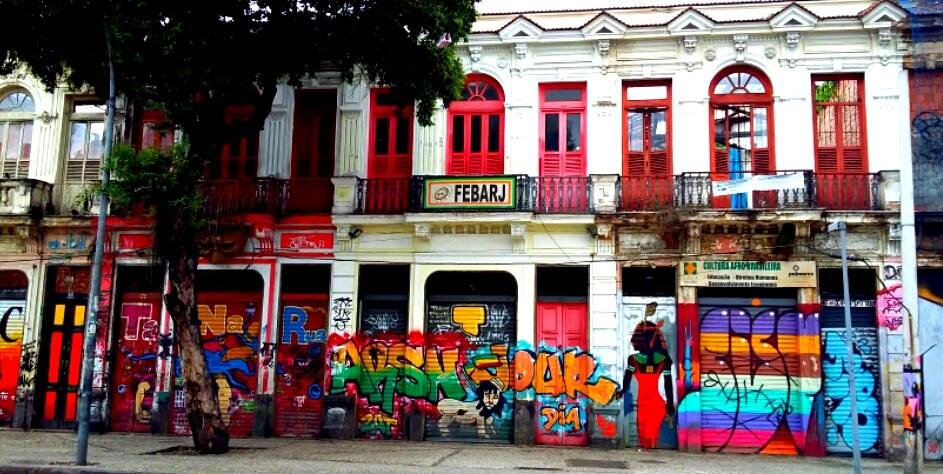Felipe Maia on Brazilian Baile Funk and Favela Bass Culture
Sao Paulo born Felipe Maia is a DJ, journalist and ethnomusicologist based in Paris. He reports on music from the Global South for media platforms like Vice, Resident Advisor, MTV Brasil; is writing a PhD on Brazilian sound systems and has a Baile Funk show on Rinse France. We explored what makes this scene magic, challenged why Baile Funk faces controversy and discrimination, and shared the top Funk tracks you NEED to know.
I left a part of my soul in Brazil when I went backpacking there in 2016. The warmth of the locals, the colours of nature and graffiti, the block parties... As an outsider looking in, Brazilian culture just speaks to me.
At the time I visited I was unaware of Baile Funk: the Hip Hop/Latino bass culture that’s been reverberating around Brazilian favelas for the past 30 years. Being London-based and totally disconnected from this world, I discovered Baile a few years later, through the Soundcloud beatmaker community. I fell in love with Funk thanks to stations like SOULECTION and producers like Sango, who take elements of Brazilian Baile and turn them into future beats, mixed with trap, jazz, rap and neo-soul.
Recently, Soundcloud’s algorithm has been feeding me the rawer side of Funk too. That’s how I first discovered Felipe Maia - through his Baile show on Rinse France, where he invites Brazilian and international artists to showcase their finest Funk selection, mixing it up with other genres too like Garage and Grime. When I did some research and found out he wasn’t just a sick DJ but a prestigious music writer, I reached out. It was the best feeling when Felipe replied saying he loved this kind of exchange and would be happy to chat!
So I started preparing for the interview. But it wasn't until I started watching documentaries about Baile that I had to laugh. I don’t speak Portuguese, so I hadn’t realised how sexual and violent the lyrics can be. It’s the same everywhere - in rap, drill, grime, hip hop, dance hall- you name it. But to me, some of Baile culture can feel even more explicit. After doing more digging, I learned that’s why this genre has been so heavily policed and frowned upon by mainstream society in Brazil.
All this got me thinking yet again about what it means to love a music scene you have absolutely zero cultural proximity to (apart from a deep feeling for the beats, of course!). Now more than ever I was hungry to learn more about the living, breathing culture from a true expert who grew up in Sao Paulo, Brazil’s main hub for Baile Funk (alongside Rio). Read on to get Felipe’s views on what makes this scene special, and find out why he takes a firm stance challenging the ongoing prejudice surrounding Baile Funk culture.
Check out Felipe’s show on Rinse to get “a flavour of the up-to-date tunes in the Baile Funk world and a lot of weird things that can be paired with the pancadão”.
How would you describe Baile Funk to somebody who's never heard of it?
Baile Funk is a Brazilian strain of hip hop and electronic music. It comes from the favelas and has been going for over 30 years now. It’s party music, so it needs to be dance-able with a huge, heavy bass and catchy lyrics. Oh - and you need to blast the speakers!
“This 80s classic tells the story of Silva, just another "funkeiro" that wanted the best for him and his family, but got killed by the police while going to a baile funk party. It’s worth reading the translated lyrics. Also, that Miami bass beat is blasting through!”
What are some of your favourite things about the movement?
What I love most is the creativity of the producers. It started in the early 90s when DJs in the Favelas who were listening to Miami Booty Bass, and little by little things started to develop.
You have a bunch of guys who don’t necessarily have the best equipment, but still make amazing music from it. Today Baile has gone global. But you’ll still find that in Brazil it’s often made in small studios with notebooks and bootleg software.
“Baile Funk is a real DIY scene, it gives me a sense of cyberpunk”.
I’m sure I’m not the first non-Portugese speaking person to be late to discover that Baile Funk lyrics can be very…
Pornographic?
“This was the first Baile funk to achieve over a billion views, straight from São Paulo”
Yeah! I laughed because I didn't realise what Putaria baile was all about. I googled Putaria baile funk and a lot of porn came up! How have factors like this affected the way Funk has been perceived in Brazil?
If you say you like Baile Funk in brazil in the 90s, people would judge you for that.
“They think it’s just pornographic shit, where they talk about drugs and stuff. But once you go deep in this kind of point of view, you see it’s racist”.
They don’t see Baile Funk as art or as culture or music. It was the same with Brazilian Samba at the start of the century. People didn’t see it as music and there were even laws against people who made Samba music.
It's so true. I watched a documentary called inside the Minds of Favela Funk, which interviewed locals in the scene. There was one guy who said “on one hand, you could say that Favela Funk is a glorification of rape and violence and sex. On the other hand, this is the reality of what goes on in the favelas. But people don't pay attention to it. So if you really want to study our reality, analyse our lyrics”.
“Baile Funk is part of hip hop - it comes from the ghetto”.
As I said at the beginning it was inspired by Miami Bass where the lyrics are quite similar. And like in the tradition of hip hop it tells stories of conflicts between police, gangs, drugs, sex. These are all things that go on in the ghettoes.
And there's one other thing that goes under all of that. Once you go to a neighbourhood in Brazil where the population is Black majority, there's a different conception of sex and the body. I’m not saying that it’s good or bad. It's just different. So for many Europeans/ white upper class Brazilians etc, they just don’t understand it.
It sounds similar to Carribean culture for example, where dutty wining is part of the cultural tradition. So yeah, some people may be scared or jealous or infatuated. Because it's different.
i see you’re mixing a lot of local talent with other cultural manifestations of Baile. Who else do you recommend?
“I love Sango and all those Soundcloud communities who’ve brought Baile to global dance floors.”
They don’t care that the genre is controversial. They just see it as real music and they push the boundaries.
For local Brazilian producers I’ve gotta shout out JLZ, kLap, LARINHX, Deekapz, DJ Rennan da Penha. Also I recommend two of Baile Funk sub-genres: Brega funk (from Brazilian Northeast region, specifically the city of Recife) and Funk 150 BPM, from Rio. These days it’s only getting faster, so now there’s also funk 170 BPM. For more of that, play out loud Iasmin Turbininha’s show on NTS, she's an amazing DJ.
What's your ethos as a Brazilian journalist researcher DJ living in Europe, representing your country’s sound?
First, I'm a white Brazilian coming from a middle class background. And Baile Funk, this music is made by Black Brazilians living in favelas. By doing this here in Europe, I'm trying to bring more awareness to it. Baile Funk is still not as well known as it should be, because we're a global South country. Our language is not English. So I want to do it some justice.
“This is one of my favourite Funk tracks. It’s got an electro vibe and a heavy volt mix beat”
For me as a white middle class woman, it's a similar thing. all the music i love is of black origin. so i like to try harder to learn where it comes from, credit and share.
Yeah, definitely. And also, why not? This is such rich music, there's so many interesting things going on. Why not try to close this gap to bridge this gap and to be more connected, instead of just listening to it?




